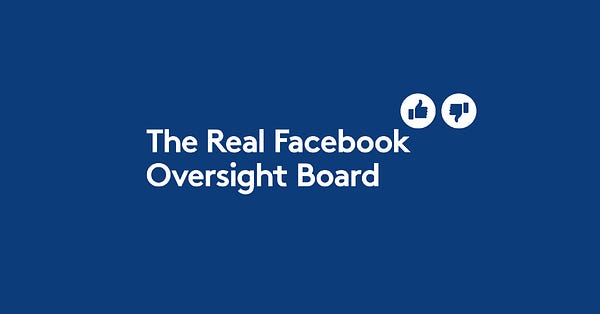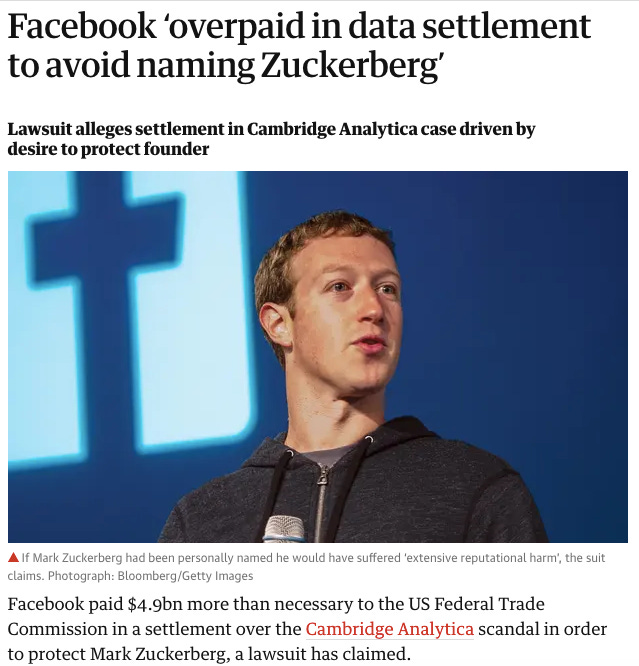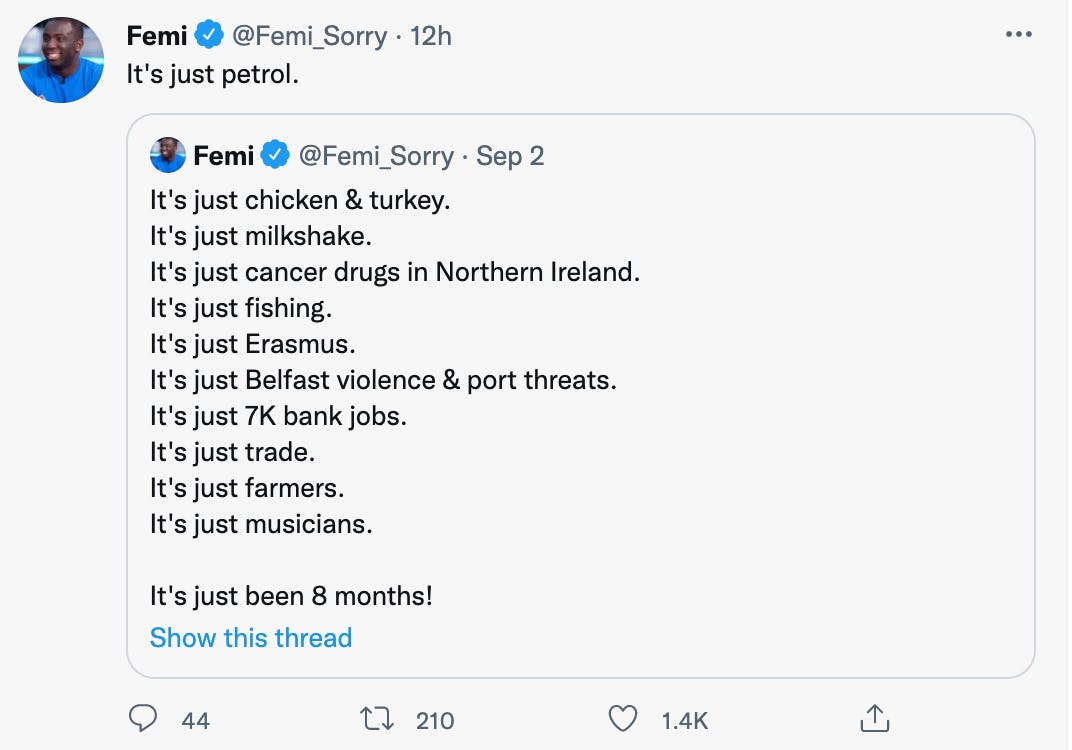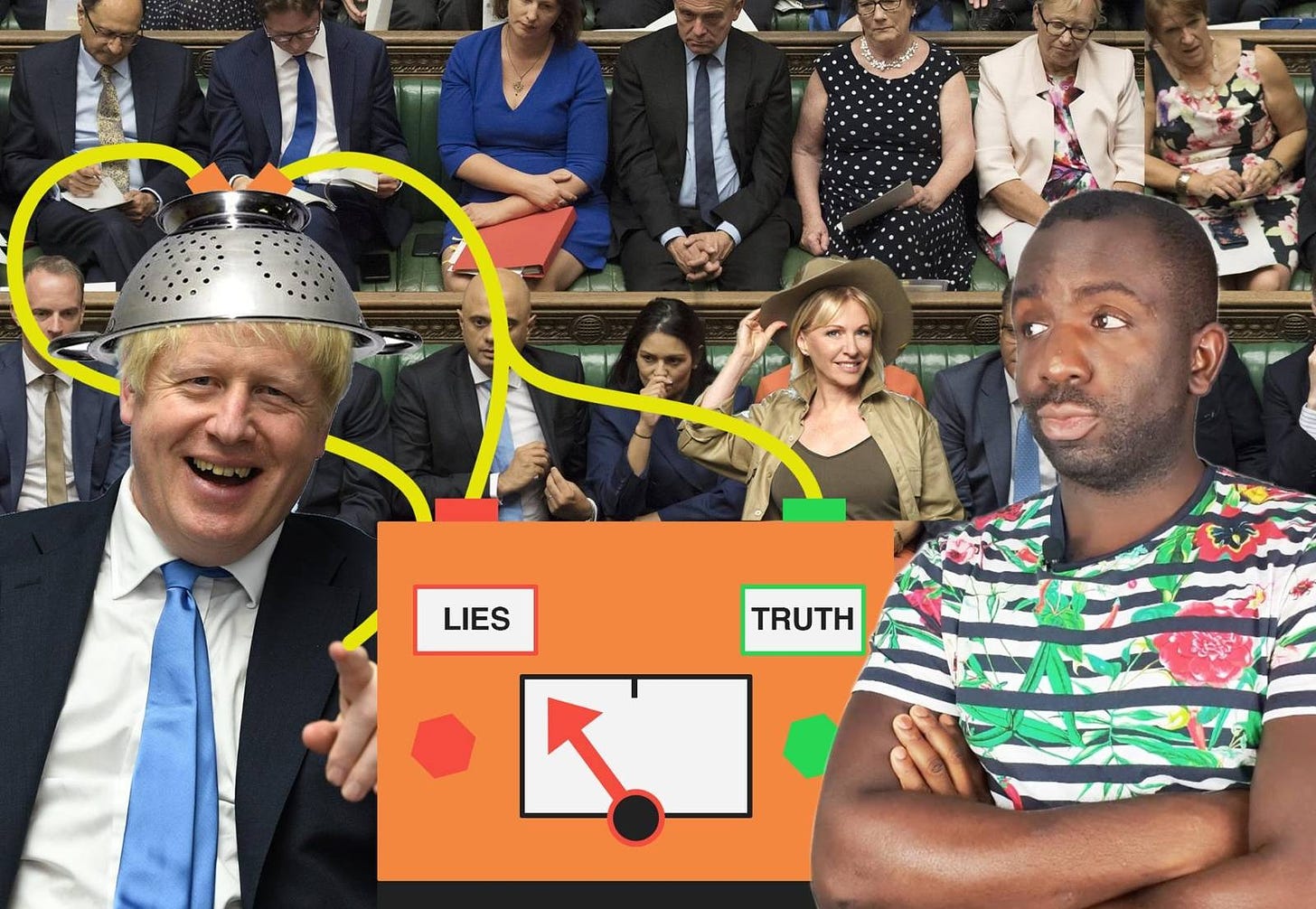Welcome to Keeping the Receipts— a newsletter from the Citizens. You can read about the mission behind this here.
If you like what you see, consider forwarding it to a friend or two. And if you’ve been reading it for free and want to support our mission, please consider signing up to the paid version.
The beginning of the end for Facebook?
It’s been a bad couple of weeks for Facebook. A series of articles from the Wall Street Journal based on a devastating set of leaks from a whistleblower inside Facebook have led to headlines across the globe. From the ‘whitelisting’ of celebrities to exempt them from the rules it applies to everyone else – including details of how Facebook allowed a Brazilian footballer to publish ‘revenge porn’ of a woman who had accused him of rape – to the burying of research which shows that using Instagram can lead to suicidal thoughts in some teenage girls.
But last week came what could be bigger news still. Jason Kint, CEO of Digital Content Next and an advisor to the Citizens’ Real Facebook Oversight Board, revealed details of a new legal case that has the potential to become the biggest scandal yet.
The legal claim had been buried on an obscure docket that Jason had found and which we published on Medium for the media to access:
As Dan Milmo, the Guardian’s global technology editor, explained in the Guardian on Saturday, the lawsuit which is based on previously unpublished internal documents, claims that Facebook cut a $4.9 billion deal with the Federal Trade Commission. The suit, which is being brought by a state pension fund that holds shares in Facebook, claims the company deliberately misled shareholders and wasted their money by seeking to cover up Mark Zuckerberg’s personal role in the Cambridge Analytica debacle.
For Facebook watchers, it’s a riveting claim based on potentially explosive new evidence. The nearest we have come to the truth, previously, of what went on behind the scenes at Facebook came when Congresswoman Alexandria Ocasio-Cortez asked Mark Zuckerberg outright: when did he first learn about Cambridge Analytica?
“I’m not sure,” he said, before deciding that it was “probably around March 2018.”

I wrote in the Observer that weekend about why this question was such a big deal for the “Cambridge Analytica super-nerds”:
The problem for Zuckerberg is not that this defies common sense, though it does. It’s that it opens up a whole new world of trouble for Facebook.
Because we know from other official investigations that employees knew about Cambridge Analytica “scraping” data from Facebook by mid-2015.
“This was the largest data scandal with respect to your company that had catastrophic impacts with regard to 2016… and you don’t know?” asked Ocasio-Cortez.
“Congresswoman, we discussed it when we were aware of what happened.”
The problem for Zuck, for Sheryl Sandberg and for the directors who sit on Facebook’s board, including Peter Thiel, the founder of the controversial data company Palantir, and Marc Andreessen, one of Silicon Valley’s most influential venture capitalists, is that if the claims made in this suit are true, if the documents the claimants have obtained show evidence of this, it would mean big trouble for Facebook.
Chief among them that Facebook deliberately misled its shareholders. It failed to disclose a data breach that led, eventually, to a huge (if temporary) collapse in its share price.
There are a lot of ifs: if this is true, and if it can be proved, and if the US authorities take action, this could be Facebook’s endgame. It’s Enron. Only much, much bigger.
Watch this space.
Welcome to a new super-nerd
There’s a new recruit to the band of Cambridge Analytica super-nerds. Zamaan Qureshi, a student of politics at the American University in Washington DC, became interested in the issues around data from watching Netflix’s The Great Hack and now plays an important role in our @fboversight team. When the Wall Street Journal published its article on the hidden harms of Instagram to teenagers, he wrote a Twitter thread on the impact of the photo-sharing app on him and his peers which became a Time magazine article and then a feature on NPR.


Today, Instagram announced it was pausing the roll-out of its new feature, Instagram Kids.
Facebook has halted work on its Instagram Kids project after revelations about the photo-sharing app’s impact on teen mental health.
Instagram said it was “pausing” work to address concerns raised by parents, experts and regulators. The move follows revelations in the Wall Street Journal (WSJ) that Facebook had commissioned research showing Instagram could affect girls’ mental health on issues such as body image and self-esteem.
Don’t mention the ‘B’ word
As the UK braces itself for a winter of possible food and fuel shortages, politicians and much of the media seem strangely reluctant to name the thing that is afflicting us. As Jonathan Freedland points out in The Guardian, Brexit has become “the Voldemort of British politics…the word that few in government or opposition will breathe out loud”. No such reticence from Femi Oluwole, the political activist who has become one of the fiercest and most forensic critics of Brexit and its consequences.
Femi was working for a human rights NGO in Brussels when the referendum was called. So disillusioned was he with the quality of debate about Brexit among politicians and the media that he decided to move back home to Solihull to launch the youth-centred pro-European Union advocacy group Our Future Our Choice.
In June 2016 he went to the Bullring centre in Birmingham, bought a T-shirt from Primark, wrote “EU questions? Just ask” on it with a marker pen and stood in the city centre for two days, engaging passers-by in conversation about the upcoming Brexit referendum. At the time he had less than 50 followers on Twitter. Five years on, that figure has grown to more than 300,000 and his smart, punchy videos calling out the government for its hypocrisy on everything from welfare cuts to climate change have become a regular fixture on social media.
So we were delighted when he agreed to collaborate with The Citizens on a weekly fact check of Prime Minister’s Questions. Any doubts we may have had about whether there would be enough material to work with were quickly dispelled…

As Femi points out, something is very wrong when you can commit to making a weekly two-minute video calling out the prime minister’s lies. But here we are. Read on for our interview with Femi about the the roots of his activism and why he has no plans to stop calling out the government any time soon.
‘I had some pretty dark thoughts after Brexit’: Q&A with political activist Femi Oluwole
Was Brexit the catalyst for your political activism or did it start before that?
I wasn't really that politically aware as a child, other than a poem that I wrote about the Iraq War when I was 12, basically calling out both George Bush and Tony Blair. I think one of the lines was, “and his puppy with lots of hair comes in the form of Tony Blair”.
I studied law because I like to argue, and French because I was good at it. But then I figured, I don't want to be a lawyer, because if you want to change the system, you need to change the rules, and lawyers simply play within the rules. And not all the rules have a solid moral basis. So I ended up doing internships in Brussels for various NGOs. I was working alongside British members of the European Parliament to try and stop arms sales to Saudi Arabia, and so I saw the EU as this protector of the moral integrity of the UK. I was involved in what I considered to be a battle for the soul of the UK long before I even heard the word Brexit.
How hard was it to come to terms with the result of the referendum?
I remember on the 12 December 2019, I was in the car park at Solihull station, about to get the train down to London for the election. And I just sat there and cried because I realised we were about to lose. After the election, there was a period of significant depression. It was never along the lines of “It was a waste of time.” It was more a personal thing, that this was probably the biggest change I could have ever made in my life, if I managed to succeed, so is everything else going to be less than that? And so I had some pretty dark thoughts, but I came out of it just in time to hit a global pandemic! So yeah…
What do you see as the most pressing political issue facing us right now?
The most urgent is the policing bill. That will effectively remove our right to protest, because once you say that any police chief on the scene can subjectively decide that [a protester] is making people feel uneasy, then you cannot go to a protest and know that your actions will not be retrospectively deemed illegal, which effectively criminalises all protests. And if we lose the right to protest, then any other rights we lose can no longer be protested for.
As for the biggest issue, that's proportional representation. It’s that simple. The Tories have been in power for about two thirds of the last 70 years. And this is despite the fact that parties to the left of the Tories have had the majority of the vote in all but three elections – 1955, 1958 and 2015. In recent years Labour and the Lib Dems have needed the SNP and Greens to make up that majority but, generally speaking, we do not vote rightwing. However, the Tories stay in power.
You’ve agreed to fact check PMQs for the Citizens. Why is this important? Simply fact checking Boris Johnson is never going to be enough because there are too many lies to counter. It’s not just about deceiving people. It’s about undermining the very concept of truth, so that it doesn’t matter whether or not it’s a lie. It’s just the fact that we’re saying it and we’re saying it with the loudest voices and more of us are saying it than on the other side. It’s a populist idea of truth. And so it's not enough to just correct him. You have to explain why he’s telling you this lie. Here’s what he’s actually trying to achieve with that misinformation.
Is it worthwhile to point out ministerial untruths when there are no consequences for lying?
That’s why the biggest issue in the country is changing the voting system. If we still have the notion of safe seats, then there are no consequences. If you know that, no matter what, you’re going to go back to a constituency that hasn’t voted Labour for decades, do whatever you want. That’s why political apathy comes about, because people know their votes don’t mean anything.
What’s giving you reason for optimism right now?
If you look at the fact that the majority have voted for parties to the left of the Conservative party at almost every election since the Second World War, [it shows] we have a progressive voting country. The opportunity to have a sustainably progressive parliament and politics is there for the taking. The question is, can those parties on the Left work together?
Also, the Gen Z-ers are more progressive than we are. We’re already seeing it with the climate strikes. Once they start having some money and the political power to make a difference, things are going to change quite quickly. We have to hope for better things.
* Femi will host a live discussion thread exclusively for paid subscribers on Wednesday night at 7pm. To join the discussion or ask Femi a question, please subscribe.








